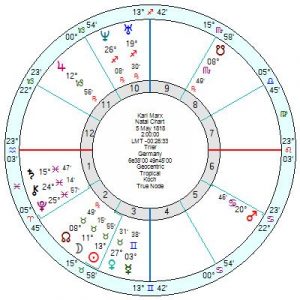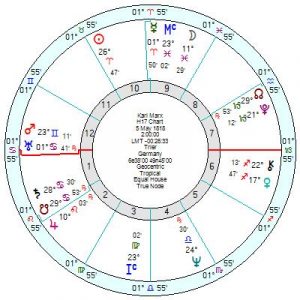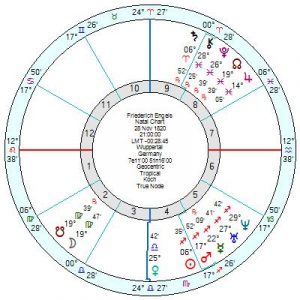Karl Marx, described as one of the most influential figures in human history, both lauded and criticised, was born on 5 May 1818 2am in Trier, Germany into a middle class, non-religious, liberally inclined Jewish family. Marx’s political writings forced him into exile in London as a stateless person, where, in collaboration with Friederich Engels, he wrote The Communist Manifesto and the three-volume Das Kapital. Their writings had enormous influence on subsequent intellectual, economic and political history.
He married and had seven children, only three of whom survived to adulthood. He himself was plagued by health problems – a liver ailment aggravated by overwork, bad diet and lack of sleep, inflammation of the eyes induced by too much work at night; and eruption of carbuncles or boils exacerbated by alcohol, tobacco, poor diet and failure to sleep.
He had a New Moon Taurus in his financial 2nd house, ironic given his perpetual shortage of money. His New Moon was in a confident and lucky trine to Jupiter in capitalist Capricorn, sextiling onto Saturn in Pisces. His Mars in excitable Cancer was in a frustrated and angry trine to Pluto, sextiling onto Venus in Taurus; and his Pluto was square a 10th house reforming, revolutionary Uranus and an idealistic Neptune. His Saturn was also in a can-be autocratic square to Uranus. His Saturn Pluto conjunction would give him a depressive streak and his Uranus Neptune is tinged with genius but also highly-strung.
It’s a powerful, talented chart but he didn’t have a happy or an easy temperament.
His leaving-a-legacy-for history 17th Harmonic is, not surprisingly, immensely strong with a Cardinal Grand Cross of Sun opposition Neptune square Saturn opposition Pluto, North Node; and Mars opposition Venus square Midheaven. His 22H is also marked which is usual for someone who made a global impact – with a ruthless Pluto Mars opposition Neptune square Venus Moon.
He wrote The Communist Manifesto with Engels in 1848, the year of ‘European Revolutions’ when Uranus and Pluto were together in Aries with Saturn catching up fast in late Pisces.
Friederich Engels was born 28 November 1820 9pm Barmen (Wuppertal) Germany, heir to a prosperous textile business, whose revolutionary tendencies disappointed his family. He was an unlikely communist sympathiser being ‘a great lover of the good life, passionate advocate of individuality, and enthusiastic believer in literature, culture, art and music.’
He had an extraordinarily Mutable chart with his Sun, Mars, Mercury, Uranus, Neptune spread out through Sagittarius with Jupiter North Node and Pluto in Pisces and a Virgo Moon. Four of his Sagittarius planets sitting in his fun-loving, sociable 5th house would make him a bon viveur. Jupiter in the 8th, blessed with money from previous generations.
Pluto in his 8th gave him the capacity for great influence – in square to Neptune with megalomaniac ambitions, square Uranus of a revolutionary nature; and in square to Mars a ruthless streak; square to Mercury dogmatic in arguments. Saturn in Aries in the 9th – self-righteous, strongly held opinions and beliefs.
There were good cross overs for joint ambitious projects with Marx’s New Moon in Taurus falling in his career 10th; and his Sagittarius planets falling in Marx’s 10th with the exception of his Sagittarius Sun which was conjunct Marx’s Midheaven from the philosophical 9th. It wouldn’t always be the easiest of relationships since his Mars was in a sparky conjunction to Marx’s Uranus but they would spark off each other.
The tr Uranus Pluto conjunction in Aries of the European Year of Revolutions in 1848 when he and Marx started to publish fell in his 10th house.
His creative and can-be-dominating 5th Harmonic was strongly marked with a hard-edged (and cruel) Mars Saturn – 5th harmonic types want to remake the world according to their writ. His leaving-a-legacy 17H was also heavily aspected, innovative and ruthless.
Although some scholars have attempted to exonerate them from blame for the state crimes of the communist regimes which followed, others have said the destructive consequences were implicit in their centralising theories.





Neptune and Uranus in Sagittarius would tie in with them being the theorists of Communist Revolution. Lenin with Neptune at 19 Aries Square Uranus at 18 Cancer had those planets in the Cardinal signs that make the ideas into a reality. The process of giving the theory physical structure driven by his Saturn at 28 Sagittarius.
Uranus Neptune in the past has been associated with religious inspiration and religious art – in their case idealistic inspiration but communism did have cultish followers, and still does. Uranus Neptune can also be fanatical, not allowing rational argument or evidence to get in the way of a strongly held belief – and can be seriously off the wall in terms of mental balance.
Very interesting. I had no idea that Uranus Neptune could be associated with mental imbalance; I assumed it was associated with Pluto. I know someone who has Mercury in Libra conjunct Neptune square Uranus in Cancer whose deceased brother suffered from schizophrenia. It clearly has had a big impact on the individual because they are completely, utterly obsessed with any whiff of mental imbalance they perceive in others….. I can see that Uranus can be erratic and create instability, but what is it about Uranus Neptune that seems to make that more extreme leading to serious mental imbalance? I have always thought air and water in a chart can create considerable conflict between the rational mind and emotions which can cause very significant problems in a person’s life. For eg, someone who has Sun in a Water sign, Moon in an Air sign or vica versa – it’s hard not to be disconnected from the emotions and there is a real challenge to integrate the two (obviously other factors in the chart need to be taken into account too.)
Ebertin describes Uranus Neptune as elimination of waking consciousness, lack of emotional balance, confused psychic states, nervous sensitiveness as well as mystical and enlightening and creative.
Interestingly Lenin treated the works of Marx and Engels as almost Holy Writ. He tended to quote them to end any debate about policy in the new Soviet State. A possible analogy is his role as “St Paul” creating the Marxist secular church. Needless, to say it soon acquired some of the less pleasant aspects of religion with its own attitude to Marxist heretics and non believers who were dealt with by the new Marxist Inquisition under the later guises of the Cheka, NKVD and KGB.
Neptune has had an oddly distorted image in recent times – wimpy, touchy feely, dripping in sentiment and compassion – when in fact it has a monstrous streak. And can carry the ‘vision’ to insane and brutal ends. Look at other examples than the ones you mention – Al Quaeda and worse ISIS, very Neptunian entities. And indeed Mengele was a highly Neptunian/Piscean type. Neptune is one face of evil.
Thanks again Marjorie. It’s fascinating to see just how long ideas continue to ripple through our collective minds. And also, I have never fully realised just how young they were when they wrote their Manifesto. It’s also interesting what you say about “their personalities writ large” – and how those personalities went on to shape much contemporary history. So many other social reformers or reporters of that era are now little known or forgotten, yet their work was important and heartfelt in many cases.
“Thanks again Marjorie. It’s fascinating to see just how long ideas continue to ripple through our collective minds.”
Yes, it’s also interesting to consider which ideas prevail and who they are attributed to. For instance, Reformation. There had been calls to renew Catholic Church for centuries, but somehow it took Luther and Calvin to give the movement larger traction. Even before that, Christianity was just one of Middle Eastern Mystery Religions that were spreading in Roman Empire. My favorite example is how Anders Chydenius, a parish rector in Kokkola or Karleby town, laid out the concept of “invisible hand” a decade before Adam Smith. In his case, the issue probably was writing in Swedish and that his argumentation was based on very concrete issue, giving free trade rights to towns “North of Stockholm” that were, especially on Eastern Shore of Gulf of Botnia, becoming major exporters of tar. I like this example, because I have one family line going to Kokkola at the time Chydenius was rector, and even his church books tell a story of a person who had truly remarkable organizational mind. And this is even more remarkable, since he was born February 26th, 1729 (and this should be accurate, since his father was rector, too). Not only a Pisces Sun, but Mercury/Mars.
“Yes, it’s also interesting to consider which ideas prevail” – yes, and also which eras they spring from. And as Marjorie says, whose personalities are “writ large” across time.
In light of our present global pandemic, and this post about Marx and Engels, I wondered about the scientist Louis Pasteur, who is of the same generation as Marx and Engels. 27th December, 1822 – he also has Uranus conjunct Neptune, but in Capricorn. His Capricorn stellium has Sun, Mercury, Venus, Mars, Uranus and Neptune. Saturn trines the Uranus-Neptune from Taurus. His work has been incredibly important, and he first presented his ideas in May, 1848 – the “year of revolutions”, and the year of the Communist Manifesto.
I’ve always been fascinated as well by who gets to be the ‘lucky’ one to get the credit for what had been said before but remained obscure. Freud was another who was unfairly dubbed a genius for coming up with original ideas when in reality there was a long tradition before him of those very ideas being in circulation. Like Marx he was a Sun Taurus with Pluto, Uranus and Mercury also in Taurus so quite a bulldozer in his way.
Right place right time must be part of it. The society/culture must be ready to absorb new ideas when these types pop up.
Yes, me too. Who carries the zeitgeist? There’s something like that with Darwin, who wasn’t the only scientist to be exploring those ideas he is famous for. And then there’s Lady Mary Wortley Montagu who had her son vaccinated against smallpox in Turkey in 1718, while many history books still tell us it was entirely Edward Jenner’s idea in 1796! I suppose an idea or discovery washes around in the collective until society is ready, as you say. Or possibly we all tune in to it, like those morphogenetic fields described by Rupert Sheldrake. Once there are enough of us, the idea is officially “born”.
There’s a fascinating chapter by Oliver Sacks in ‘Forgetting and Neglect in Science’ edited by Jonathan Miller which I found invaluable when wrestling with why ideas which are ‘known’ don’t make it into the mainstream.
‘Oxygen was all but discovered in the 1670s by John Mayrow but his work was then forgotten and concealed from view by a century of obscurantism and oxygen was only rediscovered a hundred years after.’
‘A discovery is premature if its implications cannot be connected by a series of simple logical steps to canonical, or generally accepted knowledge.’
‘Scotoma” involves more than prematurity, it involves the deletion of what was originally perceived, a loss of knowledge, a loss of insight, a forgetting of insights that once seemed clearly established, a regression to less perceptive explanations. All these not only beset neurology but are surprisingly common in all fields of science.’
It helped me understand why in the 1990s it was so difficult to get the notion of dissociative amnesia accepted, when study after study indicated that traumatised people do forget and then remember later. I wasn’t happy about it but if it happens elsewhere it doesn’t feel so bad. It does also explain why astrology has never been accepted – it doesn’t fit into any known framework.
Dissociative amnesia/recovered memory was ultimately accepted after a vicious, long-drawn out professional argument when it dragged through the Schopenhauer process of being vilified, violently opposed then accepted as self-evident. And hard evidence from brain scans helped, where studies had not. Not that 99.99% of people understood what the neuroscience meant but it reassured the sceptics.
Regrettably astrology is unlikely to get that kind of hard evidence anytime soon.
That makes complete sense, thank you I will read it. Funny about the disassociative amnesia, it is so clear anecdotally and in personal experience of so many people. Yet so hard to prove it I suppose….I know from personal experience that a major accident or trauma can come back in fragments, and then seem to form itself into a more cohesive narrative eventually.
The problem with astrology is that people seem to think it is some kind of witchcraft. Or all seeing eye…..and why haven’t we all won the lottery yet!
Thank you very much Marjorie, glad I asked!
Is there a reference site or book re Harmonics?
Thank you again.
David Hamblin is good, or Michael Baigent. Or to start with just google Astrology harmonics and various sites explain it. Bob Marks is well written.
“His 22H is also marked which is usual for someone who made a global impact – with a ruthless Pluto Mars opposition Neptune square Venus Moon.”
I am not a student of astrology, would it be/is it possible for Marx’s personal horoscope, through his writings, to influence the outcome of the application of his theories? As every Marxist/Communist government has been ruthless in destroying it’s opponents.
Marx was a New Moon Taurus which is a common dictators’ sign (viz Hitler etc); and individually can be dominating with underlying power and control issues; and he has an unyielding Saturn Pluto; with his Mars trine both Saturn Pluto which does not suggest a sentimental cast of mind, quite the reverse.
Engels equally with his strong dominating 5th Harmonic, marked ruthless Mars square Pluto and indeed opportunistic Mars square to Jupiter also suggests a less than sensitive approach to railroading through his ideas. Both have autocratic Saturn square Uranus. I might have expected to see more Air in both charts which is common with ideologues, who tend to put theories before humanity.
Neither were overflowing with the milk of human kindness despite their avowed love of the poor and given their global impact, no surprises that the consequences of their writings turned out to be less than liberal. Their effect was their personalities writ large.
Marjorie, Thank you for that lucid explanation which made things clear despite my lack of astrological knowledge.
Thank you Marjorie. What a chart he had. I was prompted to have a quick look at Engels 28th November, 1820. It’s got eight mutable planets, mutable Nodes (Pisces), and even BML is mutable. The Saturn in Aries trines the Sun for some kind of anchor. Interesting how mutability and philosophy or politics connect. I wonder if either Marx or Engels realised that people would still be debating their proposals and ideas in the 21st century!
Thank you Marjorie, he is a fascinating case study. No surprise he was an Aquarius rising with Uranus in the tenth. His domestic life is also interesting surrounded as he was by five supportive women, his aristocratic wife Jenny Von Westphalia, three daughters and his housekeeper. Sadly, one daughter died at the age of 38 from bladder cancer, Eleanor (whose biography I read a few years ago) committed suicide having discovered her husband had secretly married another woman and Laura who also committed suicide with her husband at the age of 66.